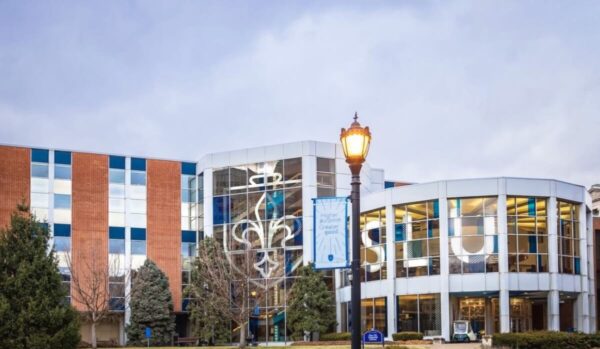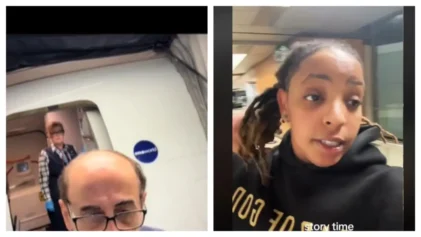A civil rights attorney representing hundreds of Black Americans whose ancestors helped build Saint Louis University during slavery demanded $70 billion in reparations for years of free labor.
Attorney Areva Martin announced the reconciliation package on Feb. 8 at the Missouri university’s Busch Student Center, where she and other prominent community members put pressure on the university to pay the arrears and avoid a potential lawsuit.
Martin spoke on behalf of 200 descendants of Henrietta Mills and Charles Chauvin, an enslaved couple owned by the Saint Louis University Jesuits, whose forced labor helped to construct the Victorian-esque campus beginning in the late 1820s.

The call for reparations emerged from a grassroots effort by the Descendants of the St. Louis University Enslaved, a powerful nonprofit group in St. Louis dedicated to preserving the legacy of their enslaved forefathers who helped establish the American gateway to the West.
“We’re not asking for a handout,” said DSLUE president Robin Proudie, also a descendant of those who were enslaved by Saint Louis University. “We’re asking for their debt to be paid.”
They estimate that $365 million is due for the unpaid labor done 24 hours per day, 365 days per year by 70 enslaved people from 1823 to 1865 in an extraordinary and well-documented case of human trafficking before the Civil War.
At a Feb. 8 press briefing to demand the payout, Proudie stood alongside relatives and expressed hope that the compensation effort in St. Louis would inspire a broader reparations movement across the nation.
“We decided as a family that we would stand up not only for us, but for all of the enslaved descendants of those who built this country,” Proudie said, according to Spectrum News.
Nearly a decade ago, Saint Louis University conducted a thorough examination of its historical ties to slavery, leading to the 2016 publication of the report titled “Slavery, History, Memory, and Reconciliation Project.”
“That report revealed that Jesuits forcefully relocated slaves from Maryland in 1823 to St. Louis specifically to exploit their stolen labor and skills to build Saint Louis University,” Martin said, noting that the dark chapter continued until 1865.
“We know that those enslaved were robbed of wages and treated with cruelty and disregarded for their humanity,” Martin said.
In 2019, the university and a catholic order of priests revealed to the descendants that their ancestors had been forced to work at the first Jesuit mission in Missouri, as well as St. Stanislaus, SLU, St. Francis Xavier College Church, and other local schools, churches and farms between 1823 and 1865.
Soon, a committee was established to determine a way forward, prompted by the stark contrast between the university’s abundant wealth as it approached its 200th anniversary and the descendants of enslaved people who built the institution but received nothing.
The committee paused its work during the global pandemic but reconvened in 2021.
According to economist Julianne Malveaux, the total compensation should be up to around $70 billion with 200 years’ worth of interest baked in, which would represent the substantial value of the enslaved labor in today’s dollars.
“The calculations that we came up with and the method that we used are time-honored methods,” Malveaux said. “The university, quite frankly, is overdue, negligent and wrong.”
State Sen. Karla May also spoke at the press conference to put pressure on the university to do the right thing.
“We are gathered here today to be clear and concise in our message that by erasing the truth, we repeat the atrocities of the past,” May said. “The lives of the enslaved people, those who were taken from Maryland and brought to St. Louis, those lives must be acknowledged.”
The university issued a statement saying it was too early to respond to the demand but that the institution shared the same resolve about the matter.
“SLU’s participation in the institution of slavery was a grave sin. We acknowledge that progress on our efforts to reconcile with this shameful history has been slow, and we regret the hurt and frustration this has caused,” the statement said.
“Continuing this work is a priority for SLU and the Society of Jesus. As we move forward, we hope to re-establish and build deeper relationships with all descendant families, to explore together how best to honor the memory of those who were enslaved by the Jesuits.”
University President Fred Pestello also sought to calm a growing storm of discontent as he faced criticism for allegedly delaying reparation efforts.
“At this point, we can affirm that we understand and share the sense of urgency expressed by several members of the descendant community. SLU’s participation in the institution of slavery was a grave sin,” he said, according to Riverfront Times. “We acknowledge that progress on our efforts to reconcile with this shameful history has been slow, and we regret the hurt and frustration this has caused.”


